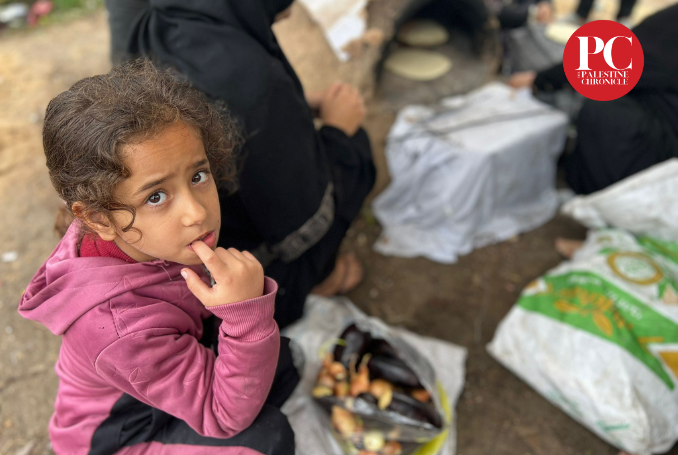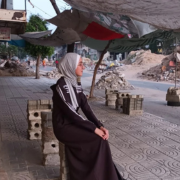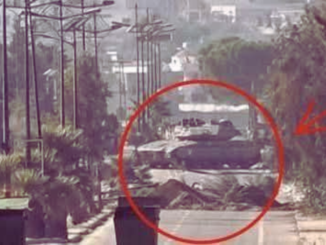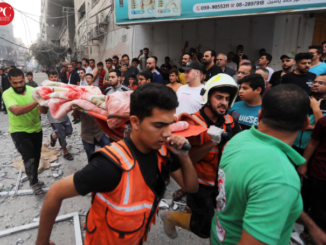
By Fatima Skaik
In Gaza, the displaced create a language of memory, loss, and survival amid the ongoing genocide.
In the journey of displacement, families do not merely carry their belongings—they carry new words, sentences woven from pain, shock, and fear, and a geography that seeps out of language.
In Gaza, displacement was not just a physical movement but a linguistic, emotional, and existential transformation. It birthed a new vernacular—a Lexicon of the Displaced—untaught in schools but spoken in tents, beneath staircases, and on the edges of sidewalks.
In Gaza, where letters collapse under the weight of blood, the displaced forge a parallel language:
Their words are knives that split open the wall of global silence. Their vocabulary is rivers flowing beneath the rubble of cities, watering the roots of uprooted trees.
As the poet Fadwa Tuqan once wrote:
“I carried my homeland in my heart…
“And so the heart became a homeland.”
‘Exile within the Homeland’
Exile here is not a journey to foreign lands but a state where one’s own homeland becomes unrecognizable: Exile is not just outside—it is inside every corner of our homeland, where distance from the familiar turns pain into lessons and stories.
It is a reminder that even within one’s own country, forced displacement can cast its shadow over the soul.
Exile is not always crossing borders, boarding a plane in a distant airport, or waiting in a refugee processing center.
Sometimes, exile is moving from street to street, neighborhood to neighborhood, from northern Gaza to its south. An exile within the homeland, yet harsher, because it forces a person to walk over their own memories to survive, to peel their name off the door of their house just to stay alive.
The irony is that the displaced Gazans never left Palestine; they remained trapped in a strip of land no wider than six kilometers.
And yet, they whisper to themselves:
“Where am I? This is not my place.”
“This street is not mine… These are not the faces I know.”
“Even the call to prayer here sounds strange… The air itself is different.”
Places become familiar in name only, they are hollow of belonging. Walls that do not echo your laughter do not belong to you.
Exile within the homeland may be crueller than abroad, for it forces you to ask: “Where is my home? Where is my real homeland?” When the place where you were born is stolen from you, exile becomes a wound that never heals—a lantern illuminating an endless darkness.
Exile is not being far from your homeland, but watching your homeland drift away from you, stone by stone, memory by memory.
‘The Suitcase of Longing’
A suitcase is never just a container for belongings—it is proof of what cannot be replaced. All we could take with us was a suitcase of longing, filled with photos, memories, and fragments that symbolize our land.
It is a testament to holding onto pieces of a past that time dares not erase, where every object carries meaning beyond space and time.
Every displaced person has a ‘suitcase of longing’, measured not by its size but by the weight of its symbols: a photograph, a prayer bead, a book, a scarf, an old scent. These are small things that do not save the body, but save memory.
The suitcase of longing is no ordinary bag stuffed with clothes and papers. It is a mobile museum of existence. Every item inside carries a significance heavier than its form: a rusted key, a fading photograph, a pendant filled with homeland soil, perhaps a scrap of fabric from a mother’s dress, now gone.
Here, where value is measured in memory, not gold, the suitcase becomes a miniature homeland—carried on the shoulder while reality is looted.
‘Nothing Beyond the Sea’
The sea is often mentioned in the words of the displaced, not as a place for outings, but as a final solution. Escape toward the sea was not a desire to swim, but to reach the farthest possible expanse of sky, air, and the slim chance of life.
In Gaza, where the earth shrinks and walls explode with gunfire, the sea becomes the final threshold of life, not an escape from it. It is no longer the blue expanse poets sing of; now, it is a watery wall besieging the city on three sides, while death approaches from the fourth.
In the lexicon of displacement, “there is nothing beyond the sea.”
The sea is our last boundary. When a child asks their father, “Where do we go if they bomb the tent?” the answer is always: “The sea… There is no place beyond it.”
It is our only direction: On the maps of the displaced, there are no arrows pointing north or south—only one, pointing west, where the waves refuse to be a refuge.
This lexicon is Gaza’s new heartbeat: A homeland made of words that refuses to die.
(The Palestine Chronicle)

– Fatima Skaik is a 21-year-old Architecture student at the Islamic University of Gaza. She contributed this article to the Palestine Chronicle.








Be the first to comment